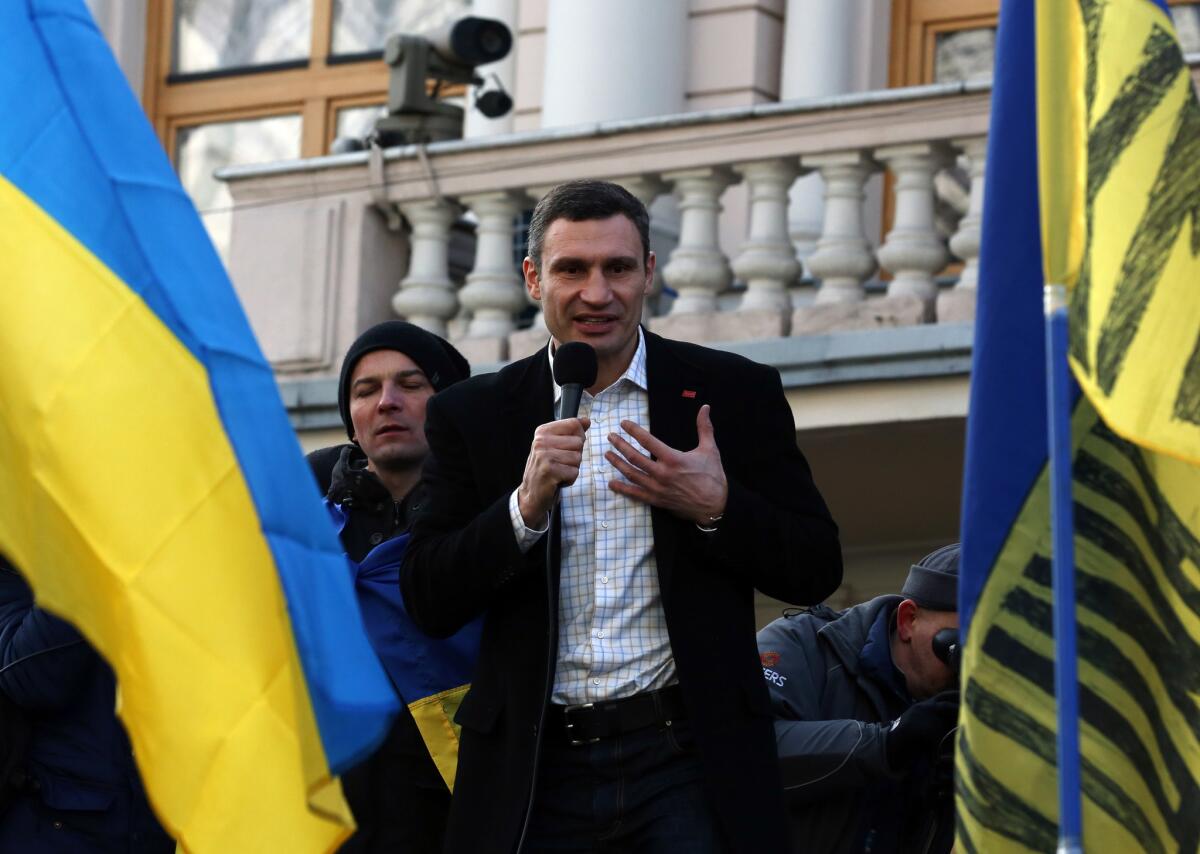Ukrainian opposition fails to pass no-confidence vote in parliament

- Share via
KIEV, Ukraine -- Ukraine’s opposition movement suffered a setback in their confrontation with the country’s Russian-backed president Tuesday when a vote of no confidence in the government failed in parliament.
Thousands of protesters who waited for several hours of the chilly afternoon outside the parliament building in Kiev angrily chanted “Shame!” and “Down with the gang!” However, they refrained from a threatened attack on the building, which was guarded by riot police, after they learned that the measure received 186 votes in favor, 40 short of what was needed.
After several days of of mass protests over President Viktor Yanukovich’s refusal to sign the trade and association agreement with Europe, the opposition leaders counted on support from communist lawmakers and defectors from the ruling Party of Regions faction to pass the measure. A vote of no confidence was seen as a first step in bringing down the government.
Vitali Klitschko, a 42-year-old opposition lawmaker and former professional boxer, insisted that street protests would continue in an effort to drive the government into early retirement.
“I hate to hear [Premier Nikolai] Azarov telling stories how Ukraine has to go around with an outstretched hand,” Klitschko told The Times inside the parliament after the vote. “If they are not stopped now, the way they go, many Ukrainians will stretch out their feet too.”
The opposition threatened to continue to hold a general strike and block as many government offices across the country as it can. Azarov and his ministers were late for the session because their offices were blockaded, they said.
Yanukovich’s decision last week to not sign the EU agreement -- which would have strengthened his country’s economic ties with Western Europe but would have angered Russia, the country’s largest energy supplier –- has triggered the most serious political conflict since the Orange Revolution in late 2004 and early 2005.
Lawmakers from the president’s party said they were pleased with the vote. Some insisted they were not intimidated by massive street protests in Kiev, despite Sunday’s bloody clashes between demonstrators and police in front of the presidential offices that left more than 300 people injured, including 140 police.
“If we succumb to this aggressive pressure and sack the government, they will continue to press more and more demands to completely dismantle the authorities and throw the country into economic and political turmoil, something we can’t allow to happen,” said lawmaker Oleg Tsaryov.
“And also we are not impressed with the numbers of people out there in [Independence] Square, which are significantly lower than what they had out there in 2005 during the so-called Orange Revolution when we gave in to their pressure,” Tsaryov said.
Sacking the government and signing the agreement with the EU would send tariffs higher and cause inflation in the national currency, the hryvnia, costing the country and especially its eastern industrial regions thousands of jobs, said Anatoly Bliznyuk, a lawmaker from Yanukovich’s party representing the coal-mining Donetsk region. Eastern Ukraine tends to be more pro-Russia than the west.
“How will I explain to 4 million people down in my region where 80% of general supplies still come from Russia that I betrayed their interests only because several hundred thousand people took to the streets in Kiev?” Bliznyuk said after the vote.
ALSO:
Portsmouth, England, bemoans loss of shipbuilding identity
Biden on delicate diplomacy mission after tension with China
Corruption worsens in world’s conflict areas, 2013 survey finds
More to Read
Sign up for Essential California
The most important California stories and recommendations in your inbox every morning.
You may occasionally receive promotional content from the Los Angeles Times.













